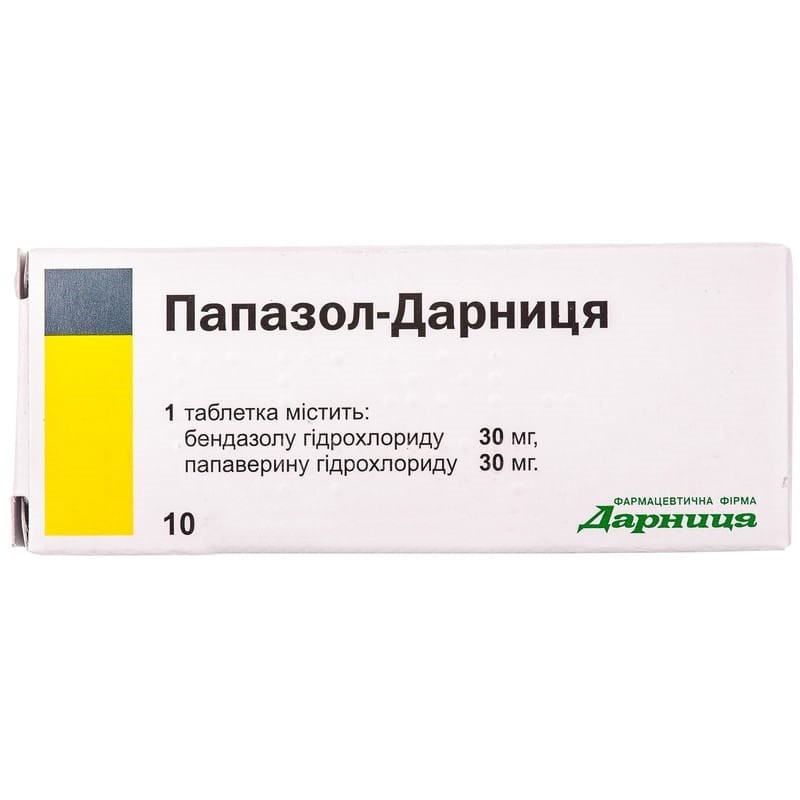



 Secure and encrypted payment processing
Secure and encrypted payment processing We ship to over 40 countries including the USA, UK, Europe, Australia and Japan
We ship to over 40 countries including the USA, UK, Europe, Australia and Japan Guaranteed refund or reship if you haven't received your order
Guaranteed refund or reship if you haven't received your orderPapazol-darnitsa is a combined drug, which includes the alkaloid papaverine and the imidazole derivative - bendazole.
Papaverine is a myotropic antispasmodic. It is an inhibitor of the FED enzyme, which causes intracellular accumulation of cyclic 3 ’, 5’-adenosine monophosphate (cAMP). The accumulation of cAMP leads to impaired contractility of smooth muscles and their relaxation in spastic conditions. It reduces the tone, reduces the contractile activity of smooth muscles and, therefore, has a vasodilating and antispasmodic effect. The effect of papaverine on the central nervous system is poorly expressed, only in elevated doses does it show a certain sedative effect.
Bendazole is a myotropic antispasmodic. Directly affects the smooth muscle condition of the vascular wall and internal organs due to the effect on imidazole receptors. It reduces blood pressure, the content of free calcium in smooth muscles, eliminates spasm of smooth muscles of the abdominal cavity, and stimulates the function of the spinal cord. Increases the ability of tissues to resist hypoxia, increases the synthesis of nucleic acids and protein.
Spasms of smooth muscles of internal organs (pylorospasm, spastic colitis, cholecystitis, peptic ulcer of the stomach and duodenum, intestinal colic, renal colic, urinary tract spasms);
Assign to adults inside 2 hours before or after a meal, 1 tablet 2-3 times a day. the maximum single dose is 1 tablet, the maximum daily dose is 4 tablets.
The duration of treatment is determined by the doctor depending on the nature and course of the disease, the effectiveness of therapy.
Hypersensitivity to the active substance or other components of the drug; violation of av conduction; severe heart failure; arterial hypotension; diseases accompanied by a decrease in muscle tone; convulsive syndrome, bronchial obstructive syndrome, bleeding ulcer of the stomach and duodenum; hypotonic colitis; habitual constipation; traumatic brain injury; severe hepatic and renal failure; chronic nephritis with edema and impaired kidney function; diabetes; hypothyroidism; adrenal insufficiency, prostatic hypertrophy, glaucoma.
In the case of rare hereditary conditions, due to which incompatibility with the excipient of the drug is possible (see SPECIAL INSTRUCTIONS), the use of the drug is contraindicated.
When using the drug in individual patients, adverse reactions characteristic of papaverine and bendazole preparations can be observed.
From the respiratory system, chest and mediastinal organs: dry cough, rhinorrhea, shortness of breath.
From the gastrointestinal tract: nausea, constipation, discomfort in the stomach.
From the liver and biliary tract: increased activity of hepatic transaminases, jaundice.
From the nervous system: headache, drowsiness, weakness, dizziness.
From the cardiovascular system: AV block, arrhythmias, decreased myocardial contractility, arterial hypotension, orthostatic hypotension, palpitations, pain in the heart, hot flashes, ventricular extrasystole, tachycardia; with prolonged use - ECG deterioration due to a decrease in cardiac output.
On the part of the blood and lymphatic system: eosinophilia.
From the immune system: hypersensitivity reactions, including rashes, itching, urticaria, Quinckes edema.
General disorders: increased sweating, hyperemia, sensation of heat.
The drug should be prescribed with caution and in doses below the average therapeutic, for severe heart diseases, supraventricular tachycardia, respiratory depression, decreased intestinal motility, shock conditions, weakened patients and the elderly.
It is not recommended to use the drug for long-term treatment of hypertension, especially in elderly patients.
When taking the drug, the development of orthostatic hypotension is possible.
When symptoms of liver dysfunction appear, in particular, gastrointestinal disturbances, jaundice, eosinophilia and an increase in the level of liver enzymes, it is necessary to stop taking the drug.
You should inform your doctor about the following symptoms: flushing, sweating, headache, fatigue, jaundice, skin rashes, nausea, stomach discomfort, constipation.
Smoking reduces the effectiveness of the drug.
While taking the drug should abandon the use of alcohol and drugs that suppress the central nervous system.
The drug contains lactose, therefore, patients with rare hereditary forms of galactose intolerance, lactase deficiency or glucose-galactose malabsorption syndrome should not take the drug.
Use during pregnancy and lactation. The drug is contraindicated during pregnancy or lactation.
Children. Do not use the drug in children.
The ability to influence the speed of reactions when driving vehicles or other mechanisms. During drug treatment, one should refrain from driving vehicles or working with other complex mechanisms.
With the simultaneous use of papazol with other drugs, these types of interactions are possible:
with antihypertensive drugs of different groups, tricyclic antidepressants, saluretics, procainamide, reserpine, quinidine, phentolamine - increased hypotensive effect; with prolonged use with β-adrenergic blockers, the drug prevents an increase in the total peripheral resistance caused by β-adrenergic receptor blockers;
with anticholinergics - increased anticholinergic effect;
with barbiturates - mutual enhancement of effects;
with levodopa, methyldopa - weakening of the effects of these drugs;
with drugs that suppress the central nervous system, an increase in the toxicity of these drugs, this combination is not recommended;
with cardiac glycosides - a marked increase in the contractile function of the myocardium as a result of a decrease in the total peripheral vascular resistance;
with adsorbents, astringents and enveloping agents - reducing the absorption of the drug from the digestive tract.
The effectiveness of the drug decreases with smoking.
Symptoms of poisoning are a combination of an overdose of papaverine and bendazole.
Symptoms of bendazole poisoning: arterial hypotension, arrhythmia, increased sweating, sensation of fever, dizziness, nausea, headache, weakness, decreased tissue perfusion.
Symptoms of papaverine poisoning: anxiety, lethargy, drowsiness, weakness, headache, sweating, blurred vision, diplopia, shortness of breath, ataxia, nystagmus, CNS depression, sinus tachycardia, partial or complete AV blockade, arterial hypotension, collapse, coma cyanosis, metabolic acidosis, hyperventilation, hyperglycemia, hyperkalemia, nausea, vomiting, constipation, gastrointestinal tract disorders, skin rashes.
Treatment: drug withdrawal, gastric lavage to clean washings, saline laxative and activated charcoal. Symptomatic treatment There is no specific antidote.
Packaging at a temperature not exceeding 25 ° C.